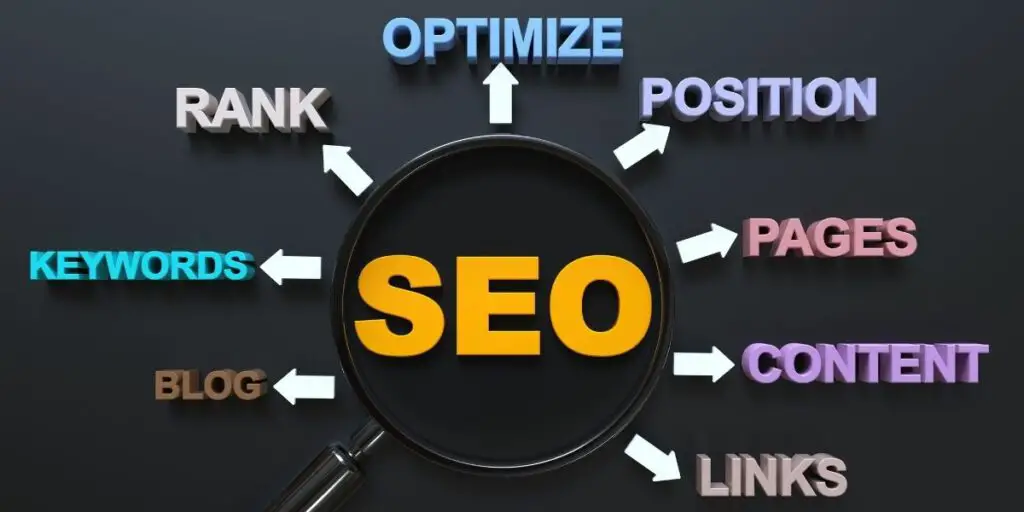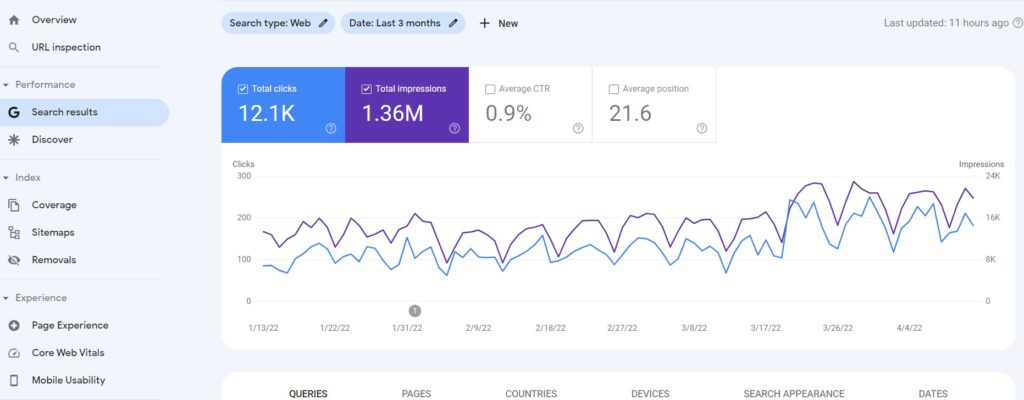Disclaimer: We sometimes use affiliate links in our content. For more information, visit our Disclaimer Page.
If you’re running a business, it’s important to ensure that many people see your website. After all, potential customers need to be able to find you to buy your products or services. That’s where search engine optimization (SEO) comes in. SEO is a process that helps your website rank higher in search engine results pages (SERPs), which means that more people will see it.
This blog post will discuss search engine optimization, how they work, and how SEO can help your business. We will also explore the different techniques used in SEO and the different strategies that you can use to improve your rankings.
What is Search Engine Optimization (SEO)?

Search Engine Optimization (SEO) is the practice of optimizing a website for Google search to earn higher web traffic levels and improve the site’s visibility.
SEO encompasses both on-page optimization (e.g., keyword research and selection, title tags, meta descriptions, etc.) and off-page optimization (e.g., link building, social media engagement, etc.).
When done correctly, SEO can help a website rank higher in search engine results pages (SERPs), driving more traffic to the site.
One important thing to keep in mind with SEO is that it is an ongoing process – it’s not something you do once and then forget about. To maintain and improve your site’s SEO, you’ll need to work on optimizing your content and building quality links continually.
Related: Marketing
Why is SEO important?
Search Engine Optimization (SEO) is important because it can help your website attract more organic (i.e., free) traffic from Google. Organic traffic is valuable because it’s targeted; people are already interested in what you have to offer if they’re searching for it on Google. This means they’re more likely to convert into leads or customers.
SEO can also help to improve your website’s ranking on Google, making it more visible to potential visitors. This can result in more traffic and, ultimately, more business.
Investing in SEO can be a smart decision for any business that wants to increase its online visibility and reach new customers. When done correctly, SEO can be an effective way to grow your business.
How do search engines work?
Understanding how SEO can help your website is essential to understanding how search engines work.
When you type a query into a search engine like Google, the search engine uses algorithms to scour the internet for content relevant to your query.
The algorithm looks at factors like the quality of the content, the relevance of the keywords used, and the web site’s popularity to determine which results to show you.
You can think of it like this – if you were looking for a new restaurant to try, you would likely ask your friends for recommendations. Search engines work similarly, except they use algorithms instead of personal recommendations to find websites.
How Does SEO Work?
To put it simply, SEO (Search Engine Optimization) is the process of optimizing a website to rank higher in search engine results.
But how does one actually go about doing that? Well, several factors come into play when it comes to ranking. Search engines like Google look at things like the quality of your content, the relevance of your keywords, how user-friendly your website is, and, perhaps most importantly, the number and quality of your backlinks.
Backlinks are links from other websites to your website. They act as a vote of confidence, in a way, and the more backlinks you have, the higher your website is likely to rank. But, of course, not all backlinks are created equal. A link from a high-quality website is worth much more than a low-quality website.
So, to sum it up, SEO is the process of making sure your website is as high-quality and relevant as possible to earn backlinks and rank higher in search engine results.
There’s a lot that goes into SEO, but if you’re just getting started, these are some of the most important things to keep in mind. Creating quality content, using relevant keywords, and building links from high-quality websites are all essential components of a successful SEO strategy.
Search Engine Optimization Techniques

There are a variety of search engine optimization (SEO) techniques that can improve the ranking of a website on search engines. However, it is advisable to consult a specialized SEO company like Houston SEO company before implementing any of the strategies on your own.
Some of the most common techniques include:
Keyword research
Keyword research is the starting point for any SEO campaign. It involves finding and selecting the best keywords for your website or blog. You can improve your website’s search engine ranking and drive more traffic to your site by targeting the right keywords.
You can use a few different methods to find keywords, including competitor analysis, keyword suggestion tools, and Google AdWords. Once you’ve selected a few target keywords, you can use them in your website’s title tags, meta descriptions, header tags, and body copy. You can also use them in your blog posts and social media updates.
Content marketing
Content marketing creates and distributes relevant and valuable content to attract, acquire, and engage your target audience. The ultimate goal of content marketing is to drive profitable customer action. To do this, you need to align your content with your customers’ needs and desires at every stage of their journey—from awareness all the way through the purchase.
Content marketing is a key piece of the puzzle for SEO. After all, it’s tough to rank high in search results without quality content. But if you create informative, keyword-rich content that aligns with searcher intent, you can improve your chances of ranking higher on search engine results pages (SERPs).
Related: Content Marketing
Link Building
Once you have content ready, the next step is to build links that target those keywords. This can be done in various ways, such as submitting articles to article directories, posting comments on other websites, or submitting your website to online directories.
Of course, the most effective way to build links is by getting others to link to your website naturally. This can be done by creating high-quality content that people want to share or participate in on social media and networking with other bloggers and website owners.
Whatever method you choose, just make sure that the links you build are relevant and targeted toward your audience. Otherwise, they won’t do you much good in terms of SEO…
On-page Optimization
On-page optimization improves the visibility and ranking of a web page in search engine results pages (SERPs). This is accomplished by increasing the quantity and quality of traffic to a site from search engines by optimizing the site’s content, structure, and associated HTML tags.
On-page optimization generally involves two main tasks:
- The optimization of the website content, including the addition of keywords and phrases in specific locations on the page (e.g., title tag, meta description, header tags, etc.), as well as the crafting of engaging and useful copy that will encourage visitors to stay on the page longer.
- The enhancement of a website’s structure and HTML tags, including the use of proper tag nesting, the addition of relevant keyword-rich titles and descriptions, as well as the use of header tags to help break up the content on the page and make it more easily digestible for both search engines and visitors.
Both tasks are essential to improve the visibility and ranking of a website or web page in search engine results pages. However, on-page optimization is an ongoing process that should be continually updated and improved to keep up with the ever-changing search engine algorithms.
Site architecture optimization
Site architecture optimization is the process of organizing a website’s pages to make it easy for search engines to find and index them. This can be done by using keywords in each page’s URLs, titles, and descriptions and ensuring that all pages are linked to other pages on the site.
Another essential part of site architecture optimization is creating a sitemap. A sitemap is a document that lists all the pages on a website and information about each page, such as the title, URL, and description. Sitemaps help search engines crawl websites more efficiently, and they can also be used to track how well your website is performing in Google Search results.
Semantic markup
Semantic markup is a technique used in search engine optimization (SEO) to improve the ranking of a website on search engines. By adding semantic markup to a website’s code, you can help Google and other search engines better understand the content of your pages. This can result in improved rankings for your pages and increased traffic from people who use search engines to find information online.
Semantic markup is also beneficial for users because it makes content easier to read and understand. Search engines can extract meaning from the tags you add to your pages and present that information easier for users to understand. This can improve the usability of your website and encourage more people to visit your pages.
Core Elements of SEO: On-Page SEO and Off-Page SEO
SEO is a long-term investment that can produce big results if done correctly. However, it’s also important to note that SEO is not a “set it and forget it” strategy – you need to work on it to maintain and improve your results continuously.
There are two core elements of SEO: on-page SEO and off-page SEO. This article will look at each of these elements and their meaning for your website.
On-Page SEO
On-page SEO optimizes your website’s content and structure to improve your ranking in search engine results pages (SERPs). This includes optimizing your titles, meta descriptions, headings, images, and other elements that contribute to your ranking.
There are several factors that you can optimize on-page to improve your SEO. Some of the most important include:
- Title tags: The title tag is the text that appears in the tab of your web browser and the search results pages. It’s essential to include your target keyword in your title tag and make sure it’s relevant to the content of your page.
- Meta descriptions: The meta description is the text that appears below your title tag in the search results pages. It’s important to write a unique and compelling meta description for each page of your website, as this can help you stand out in the search results. In addition, it helps help search engines understand your content.
- Headings: Headings are the titles and subheadings that appear throughout your website. They’re important for both SEO and usability, as they help break up your content and make it easy to read.
- Images: Images are an essential part of any website and can help to improve your SEO. Include relevant keywords in your image file names and alt text, and compress your images to reduce their file size.
Off-Page SEO
Off-page SEO is building links to your website from other websites. The more high-quality links you have, the higher your website will rank in the search engine results pages.
Several different factors go into link building, including:
- Quantity of links: The more links you have, the better. However, it’s more important to focus on quality over quantity.
- Quality of links: The quality of your links is more important than the quantity. Make sure to only get links from websites relevant to your niche and have a high Domain Authority.
- Anchor text: The anchor text is the text that appears in the link. It’s essential to include your target keyword in your anchor text, as this can help to improve your ranking.
- Link placement: The placement of your links is also essential. Place them in areas where they will be easily seen and clicked on, such as your website’s sidebar, header, or footer.
What Are the Most Important SEO Ranking Factors?

There are many factors in search engine rankings, but the content is king. Creating high-quality, informative, keyword-rich content is the best way to improve your website’s SEO and boost your ranking on search engine results pages (SERPs).
Along with content and links, here are some other important SEO factors:
- A number of incoming links: Incoming links from high-quality websites tell search engines your website is also high quality.
- Quality of incoming links: Incoming links from relevant websites tell search engines your website is also relevant.
- Keyword phrase usage: Including your target keyword phrases in your website’s content and titles helps search engines find and rank your website for those terms.
- Page loading speed: A fast-loading website keeps visitors engaged and prevents them from clicking away.
- User experience: Creating a positive user experience, including easy navigation and interesting content, keeps visitors on your website longer and improves their chances of becoming customers.
- HTML and schema markup: Using HTML tags and schema markup helps search engine crawlers understand your website’s content and can give your website a boost in SERPs.
- Domain authority: A website with a strong backlink profile and long history is more likely to rank higher than a new website.
- Social media signals: The more people who share and like your website content on social media, the higher it will rank in search engine results.
- Mobile Optimization: As more and more people use mobile devices to search the web, it’s essential to make sure your website is optimized for these users. This includes having a mobile-friendly design and layout and fast page loading speeds.
- Key usage metrics: Understanding which keywords drive traffic to your website and how much traffic they’re generating can help you focus your SEO efforts on the right terms.
These variables, along with the search engine’s knowledge of your material, are used to generate rankings for various searches (also known as queries) conducted on search engines.
How can SEO benefit my website?
There are many SEO benefits, but we’ll focus on a few of the most important ones here.
1. Improved visibility in search engine results pages
One of the main benefits of SEO is improved visibility in SERPs. If you rank higher in SERPs, you’ll get more traffic to your website.
2. Increased Search Engine Traffic
SEO can also help you get more website traffic. When you rank higher in SERPs, more people will visit your website.
3. Higher conversion rates
SEO can also help you achieve higher conversion rates. When people find your website through a search engine, they’re already interested in what you have to offer. This means they’re more likely to become customers or clients.
4. More leads and sales
SEO can also help you generate more leads and sales from your website. When people find your website through a search engine, they’re already interested in what you have to offer. This means they’re more likely to become customers or clients.
5. Improved brand awareness
SEO can also help improve brand awareness for your website. When people search for keywords related to your business, they’ll be more likely to find your website and learn about your brand.
Top SEO tools

There are a lot of SEO tools out there, and it can be tough to decide which ones to use.
Here are some of the top SEO tools that I recommend:
Ahrefs: SEO Keyword Tool
The Ahrefs SEO Keyword Tool is an excellent tool for finding keywords that you can use in your website’s content to improve your search engine ranking. The tool allows you to see how many people are searching for a particular keyword each month and the level of competition for that keyword. You can also see related keywords and other information to help you choose the right keywords for your website.
Google Search Console: Top SEO Tool
If you’re like most people, you probably think of Google Search Console as a way to check your website’s search engine ranking. However, Search Console is much more than that. It’s a powerful tool that can help you improve your website’s SEO.
Here are some things that you can do with Google Search Console:
- Check your website’s search engine ranking.
- Monitor your website’s search traffic.
- See which keywords people are using to find your website.
- Understand how people are interacting with your website.
- Get insights into any technical issues with your website.
- Optimize your website for better search engine ranking.”
SEMRush: Marketing SEO Tools
SEMRush is a great tool for researching the competition, finding keywords, and tracking your website’s ranking. In addition, it has a wide range of features that make it an essential tool for any marketer looking to improve their SEO skills.
KWFinder: SEO Keyword Tool
KWFinder is a great SEO tool that can help you find keywords for your website. It’s easy to use and has many features that can help you optimize your website for search engines.
Moz Pro: SEO Software
Moz Pro is a great SEO tool because it offers users a wide variety of features to help them improve their website’s search engine ranking. These features include tracking rankings for keywords and links, researching competitor websites, and receiving tips and advice from the Moz community.
Ubersuggest: Keyword Tracking Tool
Ubersuggest is a great tool for tracking keywords and helping to improve your SEO. It allows you to see how well your website ranks for certain keywords and helps you find new keywords to target. It also provides some helpful tips on how to improve your website’s ranking. Overall, Ubersuggest is a great tool that can help you improve your website’s SEO.
Answer The Public: Free SEO Tools
Answer The Public is a free SEO tool that provides you with a list of questions people ask about your keyword on search engines. This is valuable information because it allows you to create content that answers those questions, which can help you rank higher on search engine results pages (SERPs).
SpyFu: Free SEO Tools
SpyFu is one of the top SEO tools available today. It provides users with valuable data and insights that can help them improve their search engine optimization (SEO) efforts. SpyFu offers a free version as well as paid subscriptions.
The free version provides limited data and features, but it can still be useful for those wanting to get started with SEO. The paid subscription gives users access to more data and features, making it a valuable tool for serious SEO professionals.
How can I find a good SEO expert?
There are many ways to find a good SEO expert. One way is to ask people you know for recommendations. Another way is to search online for forums or websites that offer reviews from SEO experts. Finally, you can use platforms like Fiverr or Upwork to find and hire an expert on your own.
When searching for an expert, it’s important to ensure that they have experience in the specific area of SEO that you need help with. You should also check their reviews and ratings to get an idea of their quality of work. Once you’ve found a few potential experts, be sure to contact them and ask questions about their services before deciding.
Hiring an expert can be a great way to improve your website’s search engine ranking. With the help of a skilled SEO professional, you can see a significant boost in your traffic and visibility online.
Which is the best place to find search engine optimization courses?
Many online and offline resources offer search engine optimization courses. However, not all of them are created equal. Therefore, choosing a reputable course that provides the latest information on SEO techniques is crucial.
One great option for finding search engine optimization courses is Coursera. Coursera is an online learning platform that offers top universities and companies courses. The courses on Coursera are interactive and self-paced. They also include assignments and quizzes to test your knowledge.
Another option for finding search engine optimization courses is Udemy. Udemy is an online learning platform that offers various courses, including SEO courses. The courses on Udemy are usually more affordable than those on Coursera. However, they are not always self-paced and may require more commitment to complete.
Finally, you can also find search engine optimization courses offline. Many community colleges and continuing education programs offer courses on SEO. These courses tend to be more expensive than online courses but can be worth the investment if you want a more hands-on learning experience.
No matter which option you choose, make sure to do your research to find a reputable course that will teach you the latest SEO techniques.
SEO Strategies: Black Hat Vs. White Hat
Black hat SEO is a technique that focuses on increasing search engine rankings through methods that violate the search engine’s terms of service. Techniques used in black hat SEO can include keyword stuffing, link spamming, cloaking, and doorway pages.
Black hat SEO tactics are often effective in the short term but can result in penalties from the search engines when detected. In addition, using black hat techniques can damage a website’s reputation with users and search engines, making it harder to rank high in future searches.
White-hat SEO is a set of tactics, methods, and strategies that optimize websites for human visitors—rather than search engines. It’s called “white hat” because it conforms to the search engine optimization (SEO) guidelines put out by Google, Bing, and other providers of web search services.
Some white-hat SEO techniques include creating quality content, earning backlinks from authoritative websites, and using keywords intelligently throughout a website. White-hat SEO practitioners believe that their websites will rank higher in web searches if they adhere to the search engine guidelines. And because search engine algorithms are constantly changing, white hat SEO must also continually adapt to remain effective.
Both black hat and white hat SEO have their place in an online marketer’s toolkit. Therefore, it’s important to be familiar with both to choose the right techniques for each website.
What is Search Engine Marketing?
Search Engine Marketiwng (SEM) is the process of improving the visibility and ranking of a website on search engine results pages (SERPs). This can be done through paid methods such as paid inclusion, paid search advertising, or paid placement.
It can also be achieved through organic methods, such as optimizing a website for better search engine ranking and improving link popularity.
SEM is used to drive traffic to a website from free and paid search engine results.
Related: SEM 101
Conclusion
SEO is a complex and ever-changing field, but the principles that drive it are relatively simple. By understanding how search engines work and what they’re looking for, you can put yourself in a much better position to improve your website’s ranking.
In addition, you can use many different techniques to boost your SEO efforts, from on-page optimization to link building. The most important thing is to be consistent with your efforts and constantly refine your approach based on the latest changes in the search engine algorithms.
What have been your experiences with SEO? Do you have any tips to share? Let us know in the comments below!





